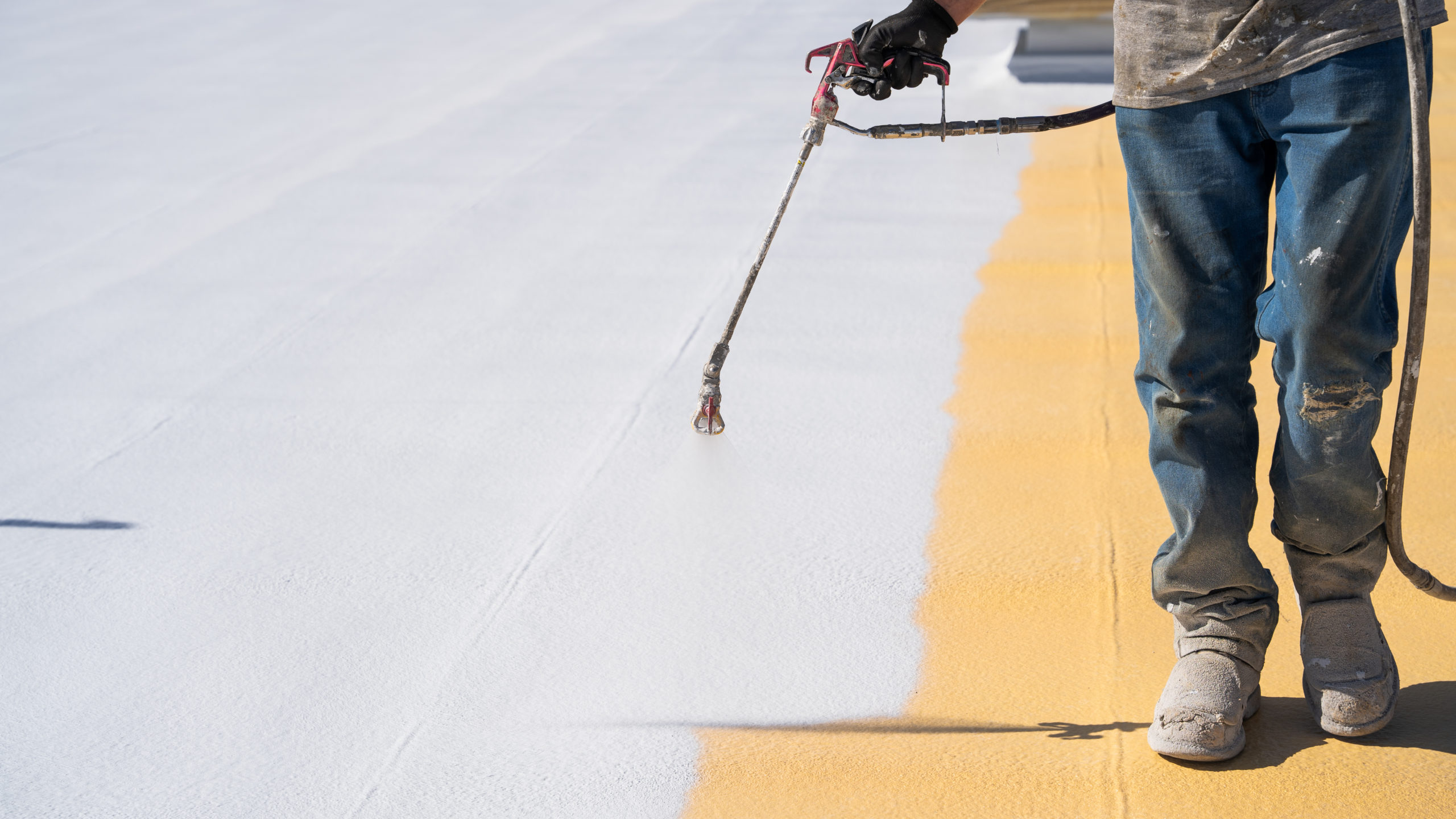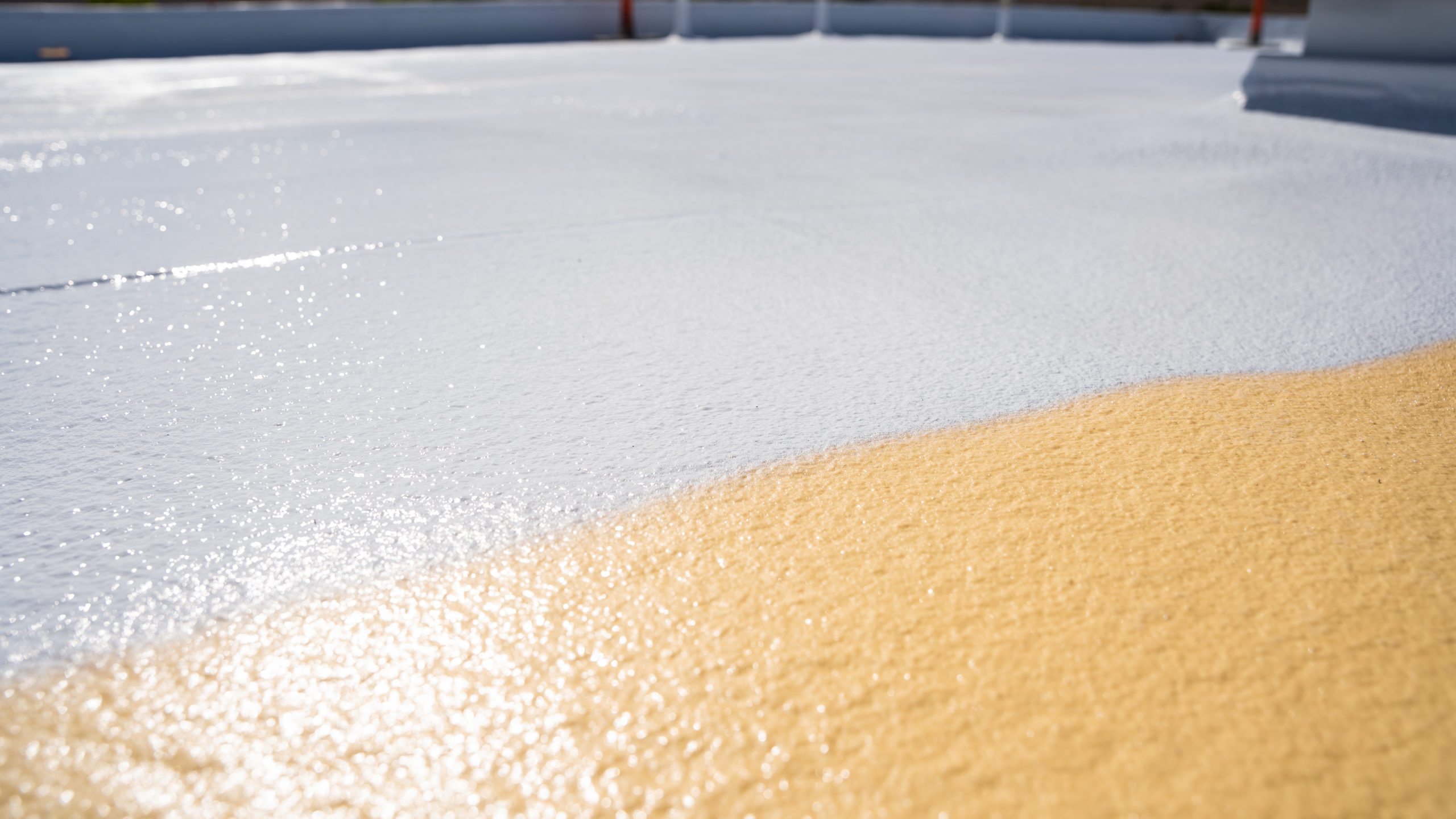
Contractors that work with spray foam insulation are familiar with the products and how they work, but they might not have considered the fact that their skillset could lead them to work on the other side of the roof, in the roofing industry.
Spray polyurethane foam (SPF) is a common and highly capable roofing solution that helps provide long-term protection for roofs on commercial buildings. SPF provides layers of protection against damage from things like hail, rain, wind, while still being light and relatively easy to maintain.
SPF lasts over 20 years and is a go-to option for many commercial building owners and managers due to its service life relative to its cost and maintenance.
Spray polyurethane foam roofing systems can be even more effective when they’re paired with elastomeric roof coatings that provide additional protection from moisture intrusion and especially UV radiation. Together, these solutions create a roofing system that protects from all the elements, from wind and rain to UV radiation and hail, for decades.
Keep reading to learn more about SPF roof solutions and how spray foam insulators can thrive in the roofing industry!
When to Use SPF Roofing Systems
SPF roofing systems are ideal for low-slope or flat roofs on commercial buildings. They’re incredibly adhesive and can be applied in a variety of settings, though they’re best for these large, open roof decks.
These low-slope or flat roofs on commercial buildings are especially susceptible to leaks or damage from the structure expanding and contracting during different seasons. As the materials move, the bolts undergo stress, and joint areas can open up gaps for water to enter. SPF roof systems solve this exact problem.
SPF roof systems are flexible (but also rigid) enough to expand and contract with the roof as it moves, without breaking or allowing leaks. They’re seamless, so unlike the actual roof construction substrate, there won’t be joints or gaps for water to enter when materials shift.
Additionally, SPF roofing systems are great options for roofs that will receive occasional foot traffic. They’re meant to provide great impact protection, so they’ll hold up well in these situations.
Overall, spray polyurethane foam provides large, low-slope roofs (like the ones found on commercial buildings) with seamless protection against the elements that hold up with expansion and contraction while delivering great R-values.
Spray Foam Roofing System Installation
SPF roofing systems, just like spray foam insulation, require trained experts to install them correctly. To start, the roof deck is evaluated and cleaned before the application begins. Then, the spray foam is applied to the specified thickness for the project, before its covered with a protective coating, such as an elastomeric coating.
The roof is coated after spraying the SPF for a few reasons:
- To reduce moisture vapor transmission (product lost to evaporation)
- Make the roof look cleaner and more visually appealing
- Enhance the overall strength and durability of the roof, along with improving its resistance to corrosion and UV damage
- To meet fire resistance criteria and roofing code requirements
Ideally, a roofing spray foam provider should be able to supply you with elastomeric coatings, to meet your project’s specific needs.
Why Spray Foam Roofing Contractors are Highly Sought After
Contractors who can deliver spray foam solutions to the inside AND outside of their customers’ buildings will be highly attractive when it comes to landing bids. They’ll be able to deliver great R-values alongside protection from weather, wind, and UV degradation. These results help to keep their customers’ buildings safer and more temperate, which leads to long-term performance results and financial savings.
Improved Protection
As mentioned before, SPF roofing systems help to protect low-slope and flat roofing systems from leaks resulting from expansion and contraction, as well as impact damage from things like hail and foot traffic. Customers who receive an SPF roofing treatment can expect upwards of 20 years of protection.
Preventing Re-Roofing Hassles
SPF roof systems last for decades, removing the need for constant repairs or maintenance. When they do need maintenance, it’s usually just re-applying an elastomeric coating to make sure UV radiation isn’t degrading the polyurethane foam. Elastomeric coatings last up to 20 years, so they won’t need to be replaced frequently, either. In these situations, it’s as easy as re-spraying or painting a new layer of the coating.
Reducing Greenhouse Gas Emissions, While Saving in Energy Costs
Commercial buildings use a lot of energy; especially when it comes to running things like heating or cooling. Proper insulation on both the inside and the outside of the roof helps to provide optimal results against temperature fluctuations. In other words, heating and cooling systems won’t have to work as hard to keep the buildings at the desired temperature because warm air won’t escape and cool air won’t get in, or vice-versa.
For this very reason, SPF roof systems help to make commercial buildings more energy-efficient, which means they’ll use less energy and reduce their carbon footprint.
Financial Savings
Protecting customers’ roofs means they spend less money on repairs or even re-roofing. Additionally, having an energy-efficient roof will mean lower energy bills over time, as their heating and cooling systems won’t have to work so hard to regulate their building’s temperature.
Roofing/Spray Foam Insulation Contractors Can Do it All
It’s worth mentioning again; if you can do both spray foam insulation and spray roofing foam installation, you’ll be extremely valuable to customers. You’ll be the expert on indoor insulation and exterior roof protection, meaning they can hire you instead of a team of subcontractors.
Accufoam® 2.8 Roof Foam

Accufoam® 2.8 Roof Foam is uniquely designed and engineered for roofing applications, brought to you by the same team that creates Accufoam® spray foam insulation.
With the same commitment and expertise dedicated to its creation as our other spray foams, Accufoam® 2.8 is positioned to be one of the most desirable roofing spray foams on the market.
When you combine it with our sister company Rugged Coatings’s elastomeric roof coatings, you’ll have everything you need to deliver roofing success for customers. This combined solution is called the Rugged Roofing System, backed by the same dedication to customer service, warranty coverage, and expert support you’ve come to know from the folks at Accufoam®.
To learn more about Accufoam® 2.8 Roof Foam or to find out how you can start to enter the roofing industry, contact us! We look forward to helping you grow and scale your business while providing you with the dependable products you need to do so.


